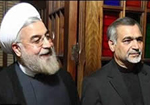 Bloomberg: Iran has for the first time sent President Hassan Rouhani’s younger brother as a special observer to the nuclear talks in Vienna, signaling the importance of the final week of negotiations before a July 20 deadline. “He’s the president’s eyes and ears,” Ali Vaez, an Istanbul-based analyst for the International Crisis Group, said in an e-mailed reply to questions.
Bloomberg: Iran has for the first time sent President Hassan Rouhani’s younger brother as a special observer to the nuclear talks in Vienna, signaling the importance of the final week of negotiations before a July 20 deadline. “He’s the president’s eyes and ears,” Ali Vaez, an Istanbul-based analyst for the International Crisis Group, said in an e-mailed reply to questions.
Bloomberg
By Kambiz Foroohar, Jonathan Tirone and Sangwon Yoon
 Iran has for the first time sent President Hassan Rouhani’s younger brother as a special observer to the nuclear talks in Vienna, signaling the importance of the final week of negotiations before a July 20 deadline.
Iran has for the first time sent President Hassan Rouhani’s younger brother as a special observer to the nuclear talks in Vienna, signaling the importance of the final week of negotiations before a July 20 deadline.
The presence of Hossein Fereydoun, who also serves as a special adviser to the president, came to light after he was photographed in one of the sessions between Iran and European foreign ministers. Fereydoun’s presence was also reported by Iran’s state-run Islamic Republic News Agency.
“He’s the president’s eyes and ears,” Ali Vaez, an Istanbul-based analyst for the International Crisis Group, said in an e-mailed reply to questions.
Thirteen days into negotiations between world powers and Iran, significant gaps remain over the Persian Gulf nation’s uranium-enrichment capacity. U.S. Secretary of State John Kerry arrived in the Austrian capital yesterday along with his counterparts from France, Germany and the U.K.
Kerry is meeting the Iranian delegation again this morning after talks lasting almost two hours yesterday night, Marie Harf, deputy State Department spokeswoman, said in an e-mail.
Gauging Iran’s willingness to make critical choices is a potentially lengthy conversation, a senior State Department official said today in an e-mailed statement.
Kerry will take the time needed to have that discussion, said the official who asked not to be named as per policy.
Last Chance
“This is perhaps the last chance in a long time to resolve the conflict over Iran’s nuclear program in a peaceful manner,” German Foreign Minister Frank-Walter Steinmeier told reporters yesterday in Vienna after meeting with diplomats at the negotiations. “There is little time remaining. The ball is in Iran’s court.”
The presence of Fereydoun, who had previously served as a diplomat at Iran’s United Nations mission in New York, may signal a greater desire by Iran to reach a deal. In a photograph of the meeting, posted by European Union spokesman Michael Mann on Twitter, Fereydoun is sitting next to Iranian Foreign Minister Mohammad Javad Zarif. He doesn’t share the same family name as Hassan Rouhani, who changed his appellation after he became a cleric.
Iran and world powers are divided over the extent of the country’s enrichment program. The U.S. and its allies seek a cut in Iran’s current capacity and curbs on future production.
Supreme Complications
Comments last week by Iran’s Supreme Leader, Ayatollah Ali Khamenei, complicated this round of talks, according to another U.S. official who asked not to be named. Iran’s highest authority said the country would eventually need up to 190,000 first-generation centrifuges or 7,000 advanced machines. About 19,000 first-generation units are currently installed, with about 9,000 in operation.
Iran’s conservative Kayhan newspaper today warned Zarif not to back down from the 190,000 level. It is “the official redline of the establishment at one of the most essential junctures of the negotiations,” said Hossein Shariatmadari, Kayhan’s editor in chief, who was appointed by Khamenei.
An interim accord that capped some Iranian nuclear activities in exchange for limited sanctions relief expires next week. Iran has said it would resume some of its suspended nuclear activities if a deal cannot be reached. The U.S. Congress has threatened to impose harsher sanctions.
Talk Extension?
“We are trying to find solutions to narrow the differences,” Iranian Deputy Foreign Minister Abbas Araghchi told state-run ISNA news agency in Vienna. “Given this context, it’s possible that negotiations will be extended by a few days or weeks.”
While diplomats in Vienna try to keep focus on the Iran nuclear talks, widening tension in the Middle East also crept into the agenda. U.K. Foreign Secretary William Hague and French Foreign Minister Laurent Fabius called for a cease-fire in fighting between Israel and Hamas militants in the Gaza Strip that has killed more than 100 civilians.
Israeli Prime Minister Benjamin Netanyahu spoke with Kerry by phone during which the Secretary of State offered to help facilitate a cease-fire, according to a U.S. official who asked not to be named following diplomatic rules.


